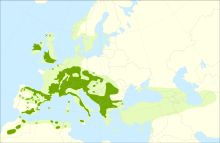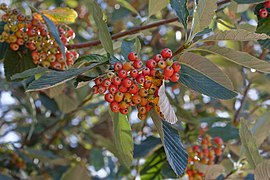Sorbus aria
| Sorbus aria | |
|---|---|

| |
| Scientific classification | |
| Kingdom: | Plantae |
| Clade: | Tracheophytes |
| Clade: | Angiosperms |
| Clade: | Eudicots |
| Clade: | Rosids |
| Order: | Rosales |
| Family: | Rosaceae |
| Genus: | Sorbus |
| Subgenus: | Sorbus subg. Aria |
| Species: | S. aria
|
| Binomial name | |
| Sorbus aria | |

| |
| Distribution map | |
| Synonyms | |
|
Aria nivea Host. | |
Sorbus aria (syn. Aria nivea), the whitebeam or common whitebeam,[2] is a deciduous tree, the type species of the subgenus Sorbus subg. Aria of the genus Sorbus. It is native to most of Europe as well as North Africa (Algeria, Morocco, Tunisia) and temperate Asia (Armenia, Georgia).[3] Typically compact and domed, with few upswept branches and almost-white underside of the leaves, it generally favours dry limestone and chalk soils. The hermaphrodite cream-white flowers appear in May, are insect pollinated, and go on to produce scarlet berries, which are often eaten by birds.[4]
The cultivars S. aria 'Lutescens',[5] with very whitish-green early leaves, and S. aria 'Majestica',[6] with large leaves, have both have gained the Royal Horticultural Society's Award of Garden Merit.[7]

Foliage and fruit
References[]
- ^ Rivers, M.C.; Beech, E. (2017). "Sorbus aria". IUCN Red List of Threatened Species. 2017: e.T62861A112294405. doi:10.2305/IUCN.UK.2017-3.RLTS.T62861A112294405.en. Retrieved 19 November 2021.
- ^ BSBI List 2007 (xls). Botanical Society of Britain and Ireland. Archived from the original (xls) on 26 June 2015. Retrieved 17 October 2014.
- ^ "Sorbus aria". Germplasm Resources Information Network (GRIN). Agricultural Research Service (ARS), United States Department of Agriculture (USDA).
- ^ The Reader's Digest Field Guide to the Trees and Shrubs of Britain p.86.
- ^ "RHS Plant Selector - Sorbus aria 'Lutescens'". Retrieved 5 March 2021.
- ^ "RHS Plant Selector - Sorbus aria 'Majestica'". Retrieved 5 March 2021.
- ^ "AGM Plants - Ornamental" (PDF). Royal Horticultural Society. July 2017. p. 98. Retrieved 13 November 2018.
| Wikimedia Commons has media related to Aria edulis. |
- IUCN Red List least concern species
- Sorbus
- Flora of Europe
- Maleae stubs

